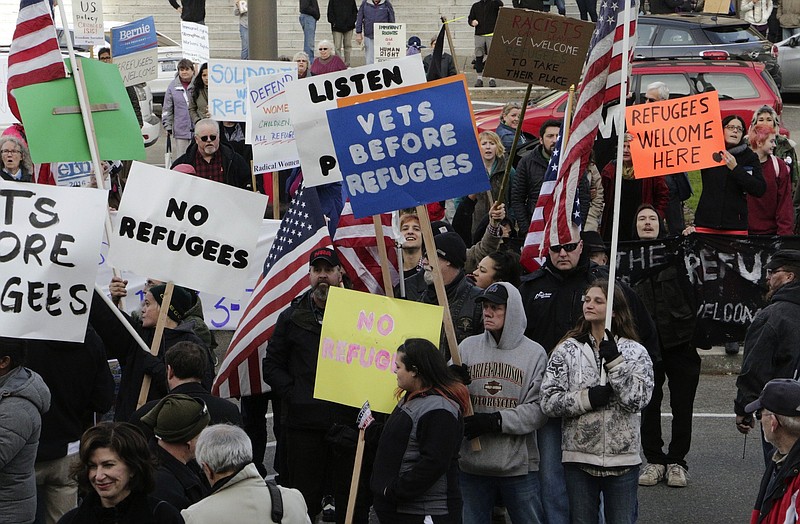A secret deal was made earlier this year to settle nearly 2,500 refugees from mostly Middle East countries in the United States - and the details are classified.
This type of action is why President-elect Donald Trump's rhetoric on the campaign trail, which went from talk of banning Muslims to "extreme vetting" to a temporary halt on taking any refugees, resonated with the American people.
Most Americans, after all, aren't unmoved by the desperation of refugees but have grown scared and weary of terrorist attacks in the United States and across the world, most perpetrated by individuals from or associated with some of the same countries from where the refugees hail.
The Obama administration's secret deal with Australia, which has a policy of rejecting refugees who come to the island by boat, involved 2,465 people currently being held in Papua New Guinea and Nauru who would be transferred to U.S. soil. Government officials would confirm only the refugees are from Afghanistan, Iran, Iraq, Pakistan, Somalia, Sri Lanka and Sudan, and that some were "stateless."
Of those countries, Iran and Sudan are on the current U.S. State Sponsors of Terrorism list. But Center for Immigration Studies fellow Don Barnett told FoxNews.com the "stateless" refugees may offer the most worry.
"These could be Burmese Muslims, who have posed assimilation issues for every nation which has taken them," he said. "It's a dangerous precedent which says, 'We'll take any ethnic group with which you don't get along.'"
The unprecedented lack of transparency with the details of the deal is concerning. Even members of Congress - who found out about the deal through the media - know little. Sen. Chuck Grassley, R-Iowa, and Rep. Bob Goodlatte, R-Va., sent a letter to Department of Homeland Security Secretary Jeh Johnson and Secretary of State John Kerry to try to learn more.
"This situation is concerning for many reasons," the letter read, charging that "your departments negotiated an international agreement regarding refugees without consulting or notifying Congress."
The congressmen also were trying to get to the bottom of why the refugees were rejected by Australia and, apparently, other countries.
"If they've been vetted and deemed inadmissible," Barnett said, "the U.S. can't say, 'You don't want them, so we'll take them.'"
Just last year, President Barack Obama pledged the U.S. would settle 10,000 displaced Syrians, whose country is in the midst of war. But don't worry, he said. The vetting process for one individual is extremely rigorous and takes around two years.
Earlier this fall, though, the White House announced it had achieved its goal of settling 10,000 refugees.
Huh? What happened to the two-year vetting process? And the State Department is still maintaining the vetting process takes an average of 18 months to two years but doesn't explain how it took just one year to do rigorous checks on 10,000.
"We have no idea who these people are, where they come from," Trump said of Syrian refugees on the campaign trail in September. "I always say, Trojan horse. Watch what's going to happen, folks. It's not going to be pretty."
On Monday, a Somali immigrant at Ohio State University rammed his car into a group of people, then exited the car and began to charge at people with a knife. Eleven people were injured.
Officials believe he was inspired by Islamic State terrorist propaganda and deceased Yemeni al-Qaeda leader Anwar al-Awlaki. His Facebook post shortly before the attack said he was "sick and tired" of seeing fellow Muslims "killed and tortured," law enforcement officials said. He also said he wanted the U.S. "to stop interfering with other countries, especially the Muslim Ummah" (Muslim people at large).
We believe Trump's policy on refugees, as it is likely to be on many other subjects, will differ from his campaign bombast. For instance, as we've mentioned before, instead of deporting all illegal immigrants, if he starts by securing the Southern border, upholds current law and prevents new illegal immigration he will have made more strides than recent presidents would or could.
So, banning Muslims might morph into something more reasonable like a temporary halt in refugee settlements. It's not unthinkable, after all, that a Trump administration might want to create a tougher, more thorough vetting system than that of his predecessor before he agrees to allow in, say, fewer than 10,000 Syrian refugees in a single year.
Indeed, the Refugee Act of 1980 gives a president wide latitude about the number of refugees admitted in a fiscal year, and Jennifer Quigley, a refugee advocate with Human Rights First, said she understands something like that is in the works.
Trump's to-do list, she said, includes the intention to "suspend immigration from terror-prone regions where vetting cannot safely occur."
In a world infinitely more dangerous than the one in which the Refugee Act was created, how can we not - even as we continue to be the most compassionate nation on earth - do all in our power to keep those in our country safe?
